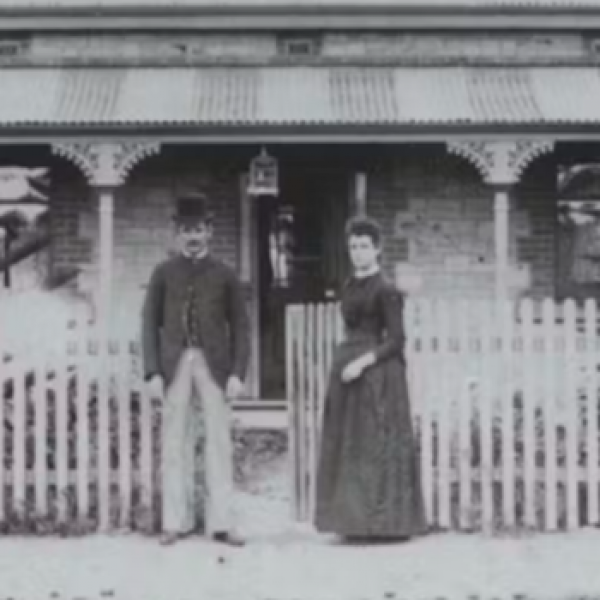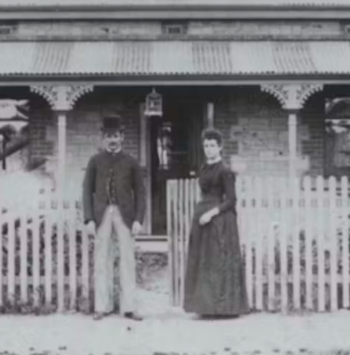
Dr Alice Neikirk
Lecturer
School of Law and Justice
- Email:alice.neikirk@newcastle.edu.au
- Phone: (02) 4921 7120
Creating more equality for less privileged groups
Criminology lecturer and social justice scholar Dr Alice Neikirk is working to improve the experiences of less privileged groups to create a more equitable world. By understanding and challenging the rhetoric, she’s making change happen.

Broadly, Alice’s work is interested in how less privileged groups interact with more powerful institutions—with a view to positive change.
This interest largely stems from her own early life experiences.
“I grew up in a rural community that experienced significant economic disruption and decline during my youth”, says Alice. “High poverty rates, youth suicide, substance abuse, and risk-taking behaviours were the norm.”
“I initially studied anthropology and sociology, falling in love with the theories that helped me understand my community and the classroom experience that fostered intellectual engagement.”
“I had an exceptional professor who encouraged me to pursue post-graduate study and consider teaching at the tertiary level.”
After completing her undergraduate degree, she spent some time travelling and was exposed to other forms of inequality and injustice. And it was in Nepal that she found her calling: the plight of refugees.
Nepal and refugee rights
While in Nepal, a friend alerted Alice to the experience of over 100,000 refugees from Bhutan who had been living in exile for close to 30 years. It impacted her so much that she returned to conduct part of her PhD fieldwork with them.
Alice’s research examined the consequences of conflict and humanitarian governance on the daily lives of the refugees.
It found that searching for the few refugees that ‘deserve’ resettlement is an effective means to regulate borders further while deflecting a more difficult conversation regarding global inequality.
This work has informed several peer-reviewed articles in top-tier journals, including the leading journal of refugee studies and the leading criminology journal on state crimes.
It also led to a book, The Elephant Has Two Sets of Teeth: Bhutanese Refugees and Humanitarian Governance(The University of Alberta Press), which underscores how well-meaning dialogues can undermine refugee rights.
A key takeaway is the strength and capabilities of communities that have faced incredible challenges but continue to strive for better opportunities for their children.
Making ripples in refugee rhetoric
Through her work, Alice has helped transform how we think about the placement of refugee camps and anti-trafficking programs within camps.
“This new model of trafficking risk will help minimise the risk of trafficking and ensure that victims are well-supported when returning to camps.”
“I’ve also proposed expanding our thinking about Intangible cultural heritage and considering its potential role in safeguarding refugee camps when other legal protections aren’t available. This has the potential to improve the lives of refugees.”
Smoothing the migration journey
In 2022, Alice co-founded the Newcastle Migration Research Network (NMRN) with colleagues across the university.
“This network brings academics, practitioners, students, and people with lived experiences as refugees together to co-create solutions for complex issues across the migration journey”, Alice shares.
Migration journeys are the movement of people from one place to another, often driven by factors such as economic opportunity, seeking refuge from conflict or persecution or pursuing education.
Human migration journeys can be voluntary or forced. They can involve internal migration (within a country) or international migration (between countries).
The network aims to create sustainable partnerships by supporting practitioners in achieving positive resettlement outcomes through exchanging knowledge while also collaboratively identifying gaps in the current research.
“These mutually supportive partnerships will help academics develop more robust theories regarding the resettlement experiences of refugees, improve support for refugees’ in the university, and provide contact points for resettlement organisations.”
To date, Alice’s work with the NMRN and community partners has led to community events that elevate the voices and experiences of people from diverse backgrounds. The network has also worked with final-year law students, service providers, and people with lived experience as refugees to develop a series of infographics to improve the legal literacy of refugees.
This will help refugees know their legal rights and obligations, fostering a greater sense of belonging and safety in our community. It also will ensure that they’re not vulnerable to misinformation or exploitation.
She’s proud of the community partnerships the NMRN has built over the last year.
“Being able to work with service providers and people with lived-refugee experience to support their flourishing in Australia is challenging, engaging, and so rewarding.”
Addressing colonial legacies in the US
Hopping continents, Alice also has a demonstrated record of successful collaboration with Tribal Partners in the United States examining Native American restorative justice practices.
This research has also provided insights into contemporary Native American culture and the complex ethnic relations between settler and indigenous societies—and has been published in SN Social Sciences.
These successful collaborations led to the invitation to co-write a grant to fund research between the Bureau of Ocean Energy Management, Tribal Elders, and NGOs exploring the development of offshore energy projects to address colonial legacies.
From legal aid to women in history
In parallel to her work on refugees, Alice has worked with lawyers in Australia, providing publicly funded legal aid as part of an exciting multi-jurisdiction project looking at the wellbeing of these crucial actors in our justice system. She shares that it’s revealing some interesting findings.
A side interest she pursues in her spare time is women in history in relation to the criminal justice system. This led her to explore the role of police matrons in Australia.
“Police matrons were the forerunners of women in policing, serving in an informal capacity for almost 50 years before receiving formal recognition,” she says. By highlighting their contributions to policing, my work has helped deepen the history of policing in Australia”.
Despite working on issues that can be quite dire, Alice always tries to approach her work with optimism: that she and her collaborators can make a modest difference, improve the experience of a few people, and that our children will inherit a slightly more equitable world.
Creating more equality for less privileged groups
Criminology lecturer and social justice scholar Dr Alice Neikirk is interested in how less privileged groups interact with more powerful institutions—with a view to positive change.
Career Summary
Biography
Dr Neikirk has a PhD from Australia’s leading research university, The Australian National University. Dr Neikirk’s research is broadly interested the ways that less privileged groups in society interact with more powerful institutions. Her doctoral research examined the consequences of conflict and humanitarian governance on the daily lives of refugees. The research found that searching for the few refugees that ‘deserve’ resettlement is an effective means to further regulate borders while deflecting a more difficult conversation regarding global inequality. This work has informed several peer-reviewed articles in top-tier journals, including the leading journal of refugee studies and the leading criminology journal on state crimes. A monograph based this research has been published with the University of Alberta Press.
In 2018, Dr Neikirk co-authored an interdisciplinary, co-authored book examining expectations for transitional justice (a sub-discipline and growing field in criminology) was published by Palgrave-MacMillan. A second co-authored book, examining the role of refugees in transitional justice is under contract with Routledge. This project is collaborative and interdisciplinary, exploring the interface of criminological and anthropological theory while maintaining a focus on incorporating stakeholders throughout the research process.
Dr Neikirk has a demonstrated record of successful collaboration with Tribal Partners in the United States examining Native American restorative justice practices. The research has also provided insights into contemporary Native American culture and the complex ethnic relations between settler and indigenous societies – it has been published in SN Social Sciences. These successful collaborations led to the invitation to co-write a grant to fund research between the Bureau of Ocean Energy Management, Tribal Elders, and NGOs exploring the development of offshore energy projects as a means to address colonial legacies.
Dr Neikirk has peer reviewed for multiple journals such as the International Journal of Transitional Justice, SN Social Sciences, AlterNatives, Refugee Review, and The Journal of Refugee Studies.
Dr Neikirk has taught university students from diverse cultural, linguistic, and economic backgrounds. Her experience teaching undergraduates, post-graduates, and adult learners in criminology but also in sociology, anthropology, and history demonstrate a deep commitment to teaching. She has taught a number of criminology courses, including courses on: the criminal justice system; criminological theory; deviance; restorative justice; serial killers; advanced criminal law; evidence; diversity and crime; statistics; victimology; and corrections. In her more than ten years of teaching in various roles at the university level, both Australia and in the United States, she has sought to prepare students for their future professional and community roles and responsibilities.
Qualifications
- Doctorate of Philosophy Anthropology, Australian National University
- Master of Anthropology, Australian National University
Keywords
- Criminology
- Forced Migration
- History of Policing
- Humanitarian Interventions
- Legal Aid
- Refugees
- Restorative Justice
Fields of Research
| Code | Description | Percentage |
|---|---|---|
| 480405 | Law and society and socio-legal research | 100 |
Professional Experience
UON Appointment
| Title | Organisation / Department |
|---|---|
| Lecturer | University of Newcastle School of Law and Justice Australia |
Academic appointment
| Dates | Title | Organisation / Department |
|---|---|---|
| 19/8/2019 - 12/7/2022 | Assistant Professor | Fresno Pacific University Center of Peace and Conflict Studies United States |
Teaching
| Code | Course | Role | Duration |
|---|---|---|---|
| CRIM 352 |
Theories of Criminology Fresno Pacific University |
Assistant Professor | 19/8/2019 - 13/7/2022 |
| CRIM 382 |
Juvenile Delinquency Fresno Pacific University |
Course Convenor | 18/8/2019 - 12/7/2022 |
| CRIM 422 |
Statistics for Criminology Fresno Pacific University |
Assistant Professor | 19/8/2019 - 13/7/2022 |
| CRIM 3002 |
Criminology Placement Newcastle Law School | University of Newcastle |
Course Coordinator | 9/1/2023 - 2/6/2023 |
Publications
For publications that are currently unpublished or in-press, details are shown in italics.
Book (2 outputs)
| Year | Citation | Altmetrics | Link | |||||
|---|---|---|---|---|---|---|---|---|
| 2023 | Neikirk A, The Elephant Has Two Sets of Teeth. Bhutanese Refugees and Humanitarian Governance, University of Alberta Press, Alberta, Canada, 265 (2023) [A1] | |||||||
| 2018 |
Nickson R, Neikirk A, Managing Transitional Justice, Springer International Publishing (2018)
|
|||||||
Chapter (16 outputs)
| Year | Citation | Altmetrics | Link |
|---|---|---|---|
| 2023 | Neikirk A, 'Conclusion: Humanitarian Gestures', The Elephant has Two Sets of Teeth: Bhutanese Refugees and Humanitarian Governance, The University of Alberta, Alberta, Canada (2023) | ||
| 2023 | Neikirk A, 'Introduction', The Elephant has Two Sets of Teeth: Humanitarian Governance and Bhutanese Refugees, University of Alberta, Alberta, Canada (2023) | ||
| 2023 | Neikirk A, 'Behind the Performance', The Elephant has Two Sets of Teeth: Bhutanese Refugees and Humanitarian Governance, University of Alberta, Alberta, Canada (2023) | ||
| Show 13 more chapters | |||
Journal article (9 outputs)
| Year | Citation | Altmetrics | Link | |||||
|---|---|---|---|---|---|---|---|---|
| 2024 |
Neikirk A, Nickson R, 'Transitions without Justice: Bhutanese Refugees in Nepal', INTERNATIONAL JOURNAL OF TRANSITIONAL JUSTICE, [C1]
|
|||||||
| 2024 |
Neikirk A, Nickson R, Rijal S, 'Intangible Cultural Heritage and the Protection of Refugees and Refugee Camps', Journal of Refugee Studies, 37 117-133 (2024) [C1]
|
|||||||
| 2023 |
Neikirk A, Nickson R, 'Towards a Spatial Analysis of Refugees Working Outside Camps', Journal of Human Trafficking, 1-14
|
|||||||
| 2021 |
Neikirk A, Nickson R, 'Potlatch justice', SN Social Sciences, 1 [C1]
|
|||||||
| 2018 |
Neikirk AM, 'A Moral Marriage: Humanitarian Values and the Bhutanese Refugees', Journal of Refugee Studies, 31 63-81 (2018) [C1]
|
|||||||
| 2017 | Neikirk A, 'Expectations of Vulnerability in Australia', Forced Migration Review, 54 63-65 (2017) [C1] | |||||||
| 2017 |
Neikirk AM, Nickson R, 'States of Impunity: Bhutanese Refugee Camps in Nepal', State Crime Journal, 6 (2017) [C1]
|
|||||||
| Show 6 more journal articles | ||||||||
Grants and Funding
Summary
| Number of grants | 4 |
|---|---|
| Total funding | $21,441 |
Click on a grant title below to expand the full details for that specific grant.
20242 grants / $9,000
Co-designing Resources to Support the Legal Literacy of Refugees$7,000
Funding body: Anonymous
| Funding body | Anonymous |
|---|---|
| Project Team | Doctor Alice Neikirk, Associate Professor Rachel Burke, Mirja Cadding-Moran, Miss Sushmita Choudhury, Doctor Jeannie Lee, Doctor Marie-Laure Vuaille-Barcan, Doctor Samuel Woldemariam |
| Scheme | Research and Discovery Fund |
| Role | Lead |
| Funding Start | 2024 |
| Funding Finish | 2024 |
| GNo | G2400029 |
| Type Of Funding | Scheme excluded from IGS |
| Category | EXCL |
| UON | Y |
Police Matrons (and their Advocates) in South Australia$2,000
The HCSA Fellowship was launched on 21 August 2020 in association with the State Library of South Australia and through the generous support of donors, including the Marsden Szwarcbord Foundation.
Fellowship holders will be expected to make use of the resources and support of the State Library of South Australia and, where appropriate, other South Australian cultural institutions and repositories in pursuing a dedicated program of historical research. Access to relevant resources and support will be facilitated by the HCSA in collaboration with the relevant institution(s).
The duration of the research work undertaken will be determined by the Fellowship holder in consultation with the HCSA and relevant institutions. It is a requirement of the Fellowship that the holder will make a presentation on the research project at a time and in a format agreed with the HCSA.
A key objective of the History Council of South Australia (HCSA) is to promote research, writing and publication specifically in the area of South Australian history. To this end the HCSA has established an annual Fellowship.
Funding body: History Council of South Australia
| Funding body | History Council of South Australia |
|---|---|
| Project Team | Alice Neikirk |
| Scheme | HCSA 2024 Fellowship |
| Role | Lead |
| Funding Start | 2024 |
| Funding Finish | 2024 |
| GNo | |
| Type Of Funding | Aust Competitive - Non Commonwealth |
| Category | 1NS |
| UON | N |
20231 grants / $9,941
The Criminal Justice System and Legal Aid and Public Defence Lawyers$9,941
Funding body: College of Human and Social Futures | University of Newcastle
| Funding body | College of Human and Social Futures | University of Newcastle |
|---|---|
| Project Team | Alice Neikirk (Lead) Ray Nickson (CoInvestigator) |
| Scheme | CHSF - Pilot Research Scheme: Projects, Pivots, Partnerships |
| Role | Lead |
| Funding Start | 2023 |
| Funding Finish | 2023 |
| GNo | |
| Type Of Funding | Internal |
| Category | INTE |
| UON | N |
20221 grants / $2,500
Research Output Support$2,500
Funding body: College of Human and Social Futures | University of Newcastle
| Funding body | College of Human and Social Futures | University of Newcastle |
|---|---|
| Scheme | CHSF - Research Output Scheme |
| Role | Lead |
| Funding Start | 2022 |
| Funding Finish | 2022 |
| GNo | |
| Type Of Funding | Internal |
| Category | INTE |
| UON | N |
News
News • 28 Jul 2023
Long before women police officers came police 'matrons': who were they and what did they do?
This year marks a significant milestone for women in policing: the 125th anniversary of the first official recognition of a police matron in Australia. However, women worked in this role for at least 50 years before receiving official recognition.
Dr Alice Neikirk
Position
Lecturer
School of Law and Justice
College of Human and Social Futures
Contact Details
| alice.neikirk@newcastle.edu.au | |
| Phone | (02) 4921 7120 |
Office
| Room | NUSpace - Level 5 |
|---|---|
| Building | NUSpace |


